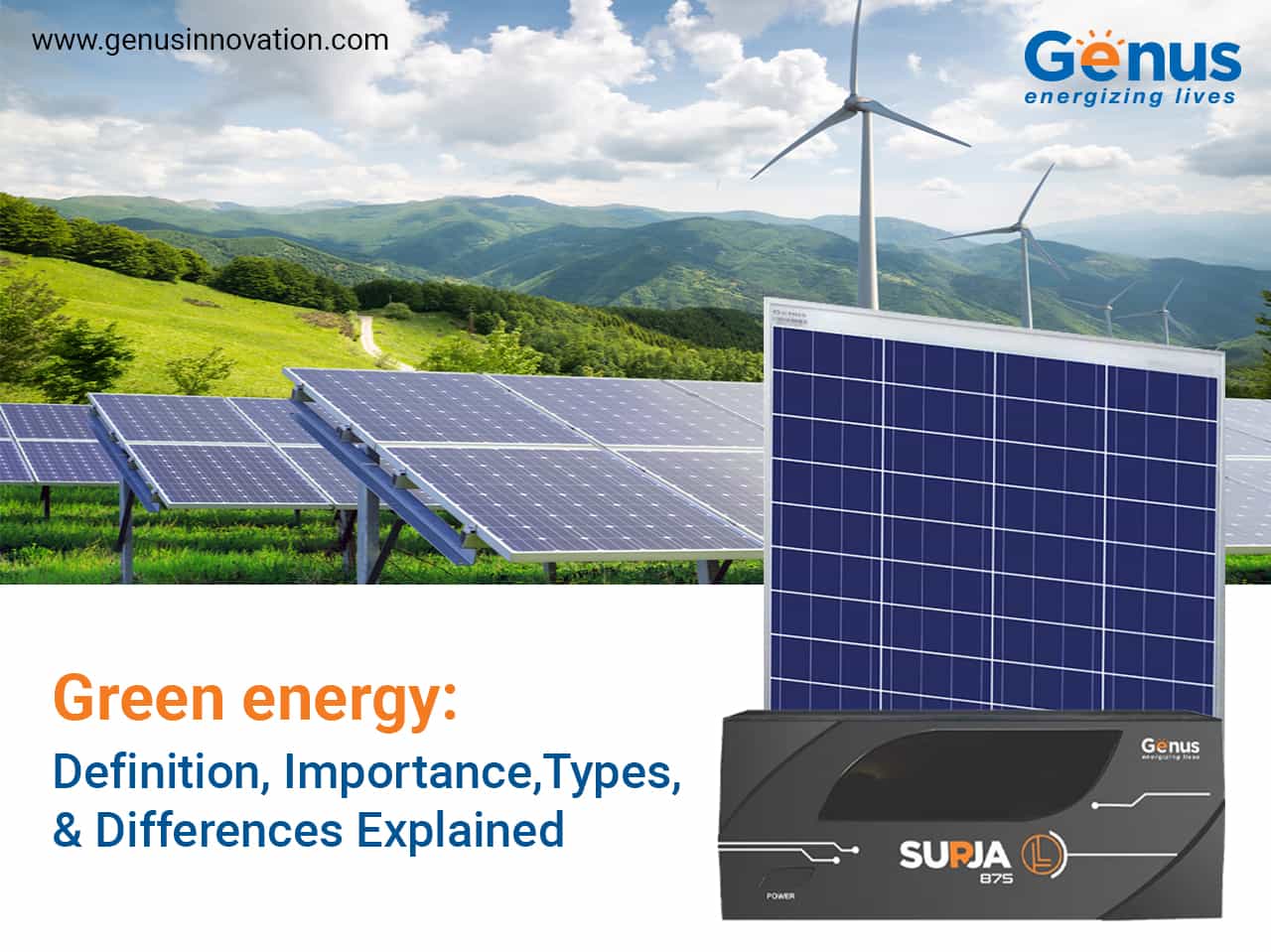What is Green Energy?
Green energy, or green power, refers to energy derived from natural sources such as sunlight, wind, or water. Unlike fossil fuels, these resources are renewable and abundant, emitting no greenhouse gases during their generation, thus minimizing environmental harm. At Genus Innovation, we harness the power of green energy to promote sustainable practices. Our top-tier solar products for homes not only help conserve finite energy resources but also contribute to a cleaner, greener future.

How Does Green Energy Benefit the Environment?
Green energy plays a crucial role in preserving our environment for several reasons.
- By replacing fossil fuels with alternatives like wind, water, and sunlight, we reduce the harmful impacts associated with traditional energy sources. These renewable resources are clean, sustainable, and far less damaging to ecosystems.
- Throughout their lifecycle, green energy technologies emit significantly fewer greenhouse gases compared to conventional methods. This reduction in pollution helps protect both wildlife and human health while ensuring the longevity of our planet.
- Economically speaking, green energy offers stability due to localized production. Unlike volatile oil markets or geopolitical conflicts, renewable sources remain unaffected by fluctuations in global supply chains. Additionally, Genus inverters are designed to store energy efficiently, making them ideal solutions for areas prone to frequent power outages.
- Investing in green energy creates jobs across various sectors, fostering economic growth worldwide. According to TWI Global, renewables supported approximately 11 million employment opportunities globally back in 2018.
- Furthermore, decentralized systems powered by wind and solar reduce reliance on centralized grids, enhancing resilience against extreme weather events while promoting flexibility under changing climatic conditions.
- Lastly, green energy provides affordable solutions tailored specifically towards meeting diverse regional energy demands without compromising quality or accessibility.
What Are Some Types of Green Energy?
Several distinct forms of green energy exist based on different natural phenomena:
1. Solar Power
Solar power draws directly from sunlight, a limitless resource supplied by our star's immense nuclear fusion reactions. When photons strike photovoltaic panels installed within residential setups like those offered by Genus, electrons move freely creating electric currents via the photoelectric effect. These direct current outputs pass through inverters converting them into alternating current suitable for household appliances. With Genus solar kits, homeowners can significantly cut down on utility expenses while contributing positively toward global sustainability goals.
2. Wind Energy
Wind turbines capture kinetic energy from moving air masses driven primarily by solar heating patterns across Earth's surface. As warm air rises over landmasses cooled by ocean breezes, differential pressures create consistent airflow patterns favorable for turbine operation. Unlike coal-fired stations producing toxic fumes harmful to public health, wind farms produce zero emissions during operation yet deliver substantial amounts of clean electricity consistently.
3. Hydropower
Hydroelectric facilities exploit gravitational forces acting upon falling streams or rivers channelled through engineered pathways increasing fluid velocity before reaching turbines connected mechanically to generators. This method has been historically reliable offering scalable capacity ranging from small community projects to massive industrial complexes capable of servicing entire cities efficiently.
4. Biogas Production
Organic waste decomposition under anaerobic conditions yields biogas composed mainly of methane alongside trace quantities of carbon dioxide nitrogen etcetera. Capturing this gas prevents landfill overflow while providing valuable combustible material useful for cooking heating lighting purposes even powering vehicles indirectly supporting circular economy principles.
5. Biomass Utilization
Burning recently deceased biological material releases stored chemical bonds accumulated over lifetimes spent photosynthesizing sunlight into usable thermal/mechanical/electrical forms albeit releasing modest levels CO2 compared to ancient hydrocarbon deposits mined today.
Are There Differences Between Green & Renewable Energies?
While often used synonymously, distinctions do exist between "green" and "renewable" terminology. Green emphasizes ecological advantages beyond mere renewability criteria alone encompassing aspects like minimal environmental footprint throughout extraction processing distribution cycles etcetera. Thus, all green energies qualify as renewables but not vice versa since certain categories might involve indirect negative side-effects despite technically replenishing themselves naturally overtime.
At Genus Innovation, we pride ourselves on manufacturing cutting-edge solar storage devices capable lasting longer than average models while delivering superior performance characteristics enhancing overall user satisfaction significantly exceeding expectations set forth industry standards benchmarks established previously.
Contact us today if interested adopting eco-conscious lifestyles embracing advanced technological innovations designed specifically addressing contemporary challenges faced collectively humanity striving towards achieving balance harmony coexistence amidst rapid technological advancements transforming modern societies rapidly evolving landscapes constantly adapting accommodating new realities emerging daily impacting lives everywhere simultaneously.
β-Alanine,Taurine,Creatine Monohydrate
Tianjin Centerstar Chemical Co., LTD. , https://www.centerstarchem.com